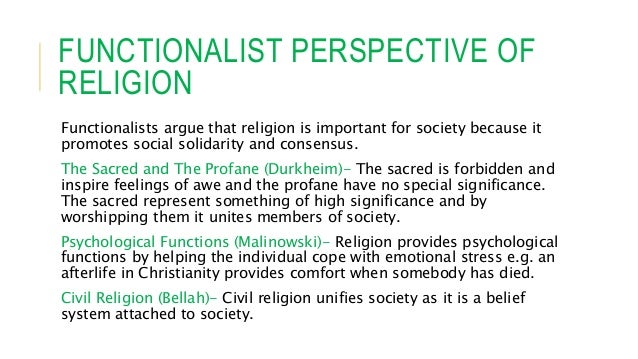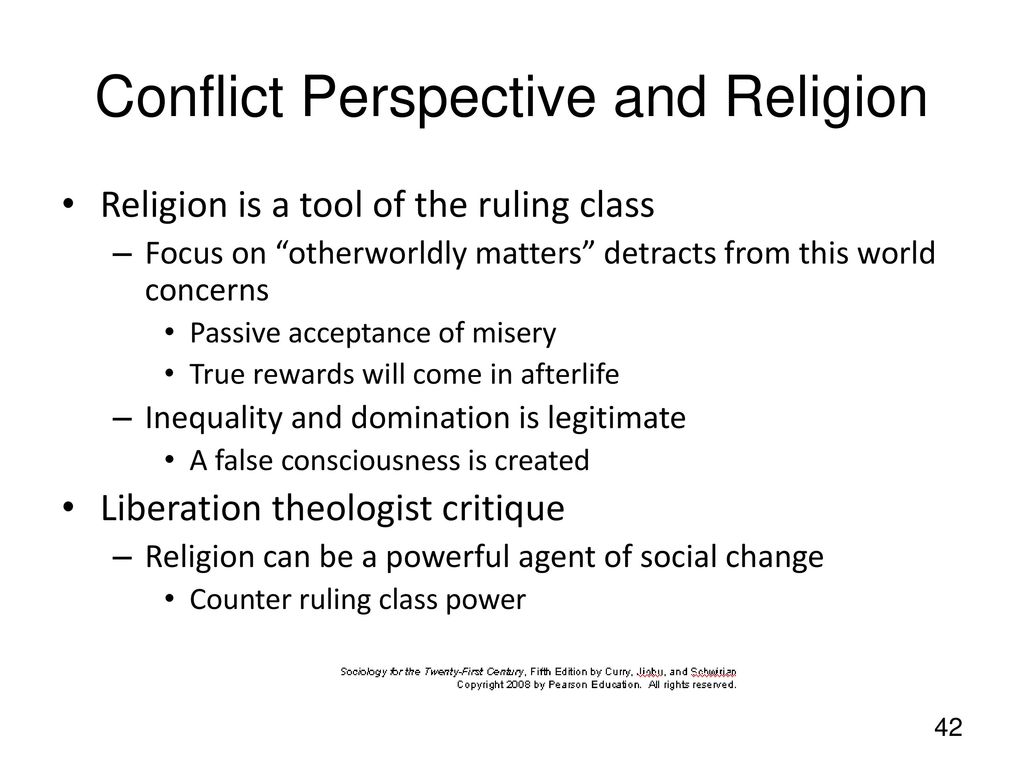Relevance: Sociology: Paper I: Religion and Society
Introduction
From the Latin religio (respect for what is sacred) and religare (to bind, in the sense of an obligation), the term religion describes various systems of belief and practice that define what people consider to be sacred or spiritual (Fasching and deChant 2001; Durkheim 1915). Throughout history, and in societies across the world, leaders have used religious narratives, symbols, and traditions in an attempt to give more meaning to life and understand the universe. Some form of religion is found in every known culture, and it is usually practiced in a public way by a group. The practice of religion can include feasts and festivals, intercession with God or gods, marriage and funeral services, music and art, meditation or initiation, sacrifice or service, and other aspects of culture.

While some people think of religion as something individual because religious beliefs can be highly personal, religion is also a social institution. Social scientists recognize that religion exists as an organized and integrated set of beliefs, behaviors, and norms centered on basic social needs and values. Moreover, religion is a cultural universal found in all social groups. For instance, in every culture, funeral rites are practiced in some way, although these customs vary between cultures and within religious affiliations. Despite differences, there are common elements in a ceremony marking a person’s death, such as announcement of the death, care of the deceased, disposition, and ceremony or ritual. These universals, and the differences in the way societies and individuals experience religion, provide rich material for sociological study.
In studying religion, sociologists distinguish between what they term the experience, beliefs, and rituals of a religion. Religious experience refers to the conviction or sensation that we are connected to “the divine.” This type of communion might be experienced when people are pray or meditate. Religious beliefs are specific ideas members of a particular faith hold to be true, such as that Jesus Christ was the son of God, or that reincarnation exists. Another illustration of religious beliefs is the creation stories we find in different religions. Religious rituals are behaviors or practices that are either required or expected of the members of a particular group, such as bar mitzvah or confession of sins (Barkan and Greenwood 2003).
The History of Religion as a Sociological Concept
In the wake of nineteenth century European industrialization and secularization, three social theorists attempted to examine the relationship between religion and society: Émile Durkheim, Max Weber, and Karl Marx. They are among the founding thinkers of modern sociology.
As stated earlier, French sociologist Émile Durkheim (1858–1917) defined religion as a “unified system of beliefs and practices relative to sacred things” (1915). To him, sacred meant extraordinary—something that inspired wonder and that seemed connected to the concept of “the divine.” Durkheim argued that “religion happens” in society when there is a separation between the profane (ordinary life) and the sacred (1915). A rock, for example, isn’t sacred or profane as it exists. But if someone makes it into a headstone, or another person uses it for landscaping, it takes on different meanings—one sacred, one profane.

Durkheim is generally considered the first sociologist who analyzed religion in terms of its societal impact. Above all, he believed religion is about community: It binds people together (social cohesion), promotes behavior consistency (social control), and offers strength during life’s transitions and tragedies (meaning and purpose). By applying the methods of natural science to the study of society, Durkheim held that the source of religion and morality is the collective mind-set of society and that the cohesive bonds of social order result from common values in a society. He contended that these values need to be maintained to maintain social stability.
But what would happen if religion were to decline? This question led Durkheim to posit that religion is not just a social creation but something that represents the power of society: When people celebrate sacred things, they celebrate the power of their society. By this reasoning, even if traditional religion disappeared, society wouldn’t necessarily dissolve.
Whereas Durkheim saw religion as a source of social stability, German sociologist and political economist Max Weber (1864–1920) believed it was a precipitator of social change. He examined the effects of religion on economic activities and noticed that heavily Protestant societies—such as those in the Netherlands, England, Scotland, and Germany—were the most highly developed capitalist societies and that their most successful business leaders were Protestant. In his writing The Protestant Work Ethic and the Spirit of Capitalism (1905), he contends that the Protestant work ethic influenced the development of capitalism. Weber noted that certain kinds of Protestantism supported the pursuit of material gain by motivating believers to work hard, be successful, and not spend their profits on frivolous things. (The modern use of “work ethic” comes directly from Weber’s Protestant ethic, although it has now lost its religious connotations.)
German philosopher, journalist, and revolutionary socialist Karl Marx (1818–1883) also studied the social impact of religion. He believed religion reflects the social stratification of society and that it maintains inequality and perpetuates the status quo. For him, religion was just an extension of working-class (proletariat) economic suffering. He famously argued that religion “is the opium of the people” (1844).
For Durkheim, Weber, and Marx, who were reacting to the great social and economic upheaval of the late nineteenth century and early twentieth century in Europe, religion was an integral part of society. For Durkheim, religion was a force for cohesion that helped bind the members of society to the group, while Weber believed religion could be understood as something separate from society. Marx considered religion inseparable from the economy and the worker. Religion could not be understood apart from the capitalist society that perpetuated inequality. Despite their different views, these social theorists all believed in the centrality of religion to society.
Theoretical Perspectives on Religion
Modern-day sociologists often apply one of three major theoretical perspectives. These views offer different lenses through which to study and understand society: functionalism, symbolic interactionism, and conflict theory. Let’s explore how scholars applying these paradigms understand religion.
Functionalism

Functionalists contend that religion serves several functions in society. Religion, in fact, depends on society for its existence, value, and significance, and vice versa. From this perspective, religion serves several purposes, like providing answers to spiritual mysteries, offering emotional comfort, and creating a place for social interaction and social control.
In providing answers, religion defines the spiritual world and spiritual forces, including divine beings. For example, it helps answer questions like, “How was the world created?” “Why do we suffer?” “Is there a plan for our lives?” and “Is there an afterlife?” As another function, religion provides emotional comfort in times of crisis. Religious rituals bring order, comfort, and organization through shared familiar symbols and patterns of behavior.
One of the most important functions of religion, from a functionalist perspective, is the opportunities it creates for social interaction and the formation of groups. It provides social support and social networking and offers a place to meet others who hold similar values and a place to seek help (spiritual and material) in times of need. Moreover, it can foster group cohesion and integration. Because religion can be central to many people’s concept of themselves, sometimes there is an “in-group” versus “out-group” feeling toward other religions in our society or within a particular practice. On an extreme level, the Inquisition, the Salem witch trials, and anti-Semitism are all examples of this dynamic. Finally, religion promotes social control: It reinforces social norms such as appropriate styles of dress, following the law, and regulating sexual behavior.
Conflict Theory

Conflict theorists view religion as an institution that helps maintain patterns of social inequality. For example, the Vatican has a tremendous amount of wealth, while the average income of Catholic parishioners is small. According to this perspective, religion has been used to support the “divine right” of oppressive monarchs and to justify unequal social structures, like India’s caste system.
Conflict theorists are critical of the way many religions promote the idea that believers should be satisfied with existing circumstances because they are divinely ordained. This power dynamic has been used by Christian institutions for centuries to keep poor people poor and to teach them that they shouldn’t be concerned with what they lack because their “true” reward (from a religious perspective) will come after death. Conflict theorists also point out that those in power in a religion are often able to dictate practices, rituals, and beliefs through their interpretation of religious texts or via proclaimed direct communication from the divine.
The feminist perspective is a conflict theory view that focuses specifically on gender inequality. In terms of religion, feminist theorists assert that, although women are typically the ones to socialize children into a religion, they have traditionally held very few positions of power within religions. A few religions and religious denominations are more gender equal, but male dominance remains the norm of most.
Symbolic Interactionism

Rising from the concept that our world is socially constructed, symbolic interactionism studies the symbols and interactions of everyday life. To interactionists, beliefs and experiences are not sacred unless individuals in a society regard them as sacred. The Star of David in Judaism, the cross in Christianity, and the crescent and star in Islam are examples of sacred symbols. Interactionists are interested in what these symbols communicate. Because interactionists study one-on-one, everyday interactions between individuals, a scholar using this approach might ask questions focused on this dynamic. The interaction between religious leaders and practitioners, the role of religion in the ordinary components of everyday life, and the ways people express religious values in social interactions—all might be topics of study to an interactionist.
Conclusion
Religion describes the beliefs, values, and practices related to sacred or spiritual concerns. Social theorist Émile Durkheim defined religion as a “unified system of beliefs and practices relative to sacred things” (1915). Max Weber believed religion could be a force for social change. Karl Marx viewed religion as a tool used by capitalist societies to perpetuate inequality. Religion is a social institution, because it includes beliefs and practices that serve the needs of society. Religion is also an example of a cultural universal, because it is found in all societies in one form or another. Functionalism, conflict theory, and interactionism all provide valuable ways for sociologists to understand religion.
For more such notes, Articles, News & Views Join our Telegram Channel.
Click the link below to see the details about the UPSC –Civils courses offered by Triumph IAS. https://triumphias.com/pages-all-courses.php


One comment